|
“May the words of my mouth and the meditation of our hearts be acceptable to you, O Lord, my rock and my redeemer.” (Ps 19:14) Last week the New York Times released classified documents of the Chinese Communist Party. China is extremely worried about its Muslim citizens. Anything, including religion, that challenges the absolute rule of the Communist Party is regarded as a threat. Christians have faced this same kind of persecution in China. According to these secret documents, up to one million Muslim citizens are imprisoned in what are called re-education facilities. The documents were instructions to local officials on how to deal with students who were coming home from college for vacations only to then discover that their families were no longer there. One particular instruction advised that if a returning student asked if their relatives had committed a crime, the response was to answer that they had not. Then they were supposed to say, “It is just that their thinking has been infected by unhealthy thoughts. Freedom is only possible when this ‘virus’ in their thinking is eradicated and they are in good health.” In other words, freedom is to do and say whatever you want as long as whatever you want is what the authorities want. What kind of freedom is that where different is illegal? I bring this up today because Jesus is proudly different. And we shouldn’t try to tame that difference. That carpenter from Nazareth, says Colossians, “Is the image of the invisible God, … in him all the fullness of God was pleased to dwell ...” This is why Jesus defines different. Why would we imagine that God has to fit into our molds? This begins to explain why God enters into the world so strangely as a Nazareth carpenter, and then preaches to us as an unemployed wanderer. For non-Christians this is so different as to be preposterous. And Jesus has upset governments and institutions and even churches for longer than He has been called the Christ. Jesus is God’s disruption of the world’s normal. And it gets even more so. While Jesus’ life was strange, His death was even more strange. Back to what is written in Colossians: “And through [Jesus], God was pleased to reconcile to himself all things, whether on earth or in heaven, by making peace through the blood of his cross.” And this is why, seemingly out of season, we share a Gospel story about Jesus’ crucifixion. The cross wasn’t defeat. The cross is the triumph of salvation. No matter what others did to Him, Jesus remained consistent and true. Even as they executed Him, Jesus would not succumb to hatred. His commitment to what He preached never wavered in life or death, and it has shown us a completely unexpected path of righteousness and hope. This is why Jesus defines different. And again, it gets even more so. Jesus doesn’t die only for those who are saddened by His suffering. Colossians has one of those astoundingly strange lines that stands out in the Bible and has led to generations of thoughtful speculation. What does it mean when Colossians reveals that “through [Jesus] God was pleased to reconcile to himself all things”? This implies not only the good and holy, as we would expect, as we would define fair, but all things are reunited with God in Jesus. This moves beyond deservers and touches on the unequivocal, unconditional love of Christ. Salvation is what God wants for “all things.” And this is just plain different. If you have a pew Bible in front of you, I’d ask you to open to Luke 23:34. When you get there, you’ll see that the verse is in double brackets, and there’s a footnote that explains that in some ancient manuscripts this verse is missing. The verse reads: “Then Jesus said, ‘Father, forgive them for they do not know what they are doing.’” It’s in double brackets because some biblical scribes, way back in the earliest history of the church, just could not handle this kind of forgiveness. They wanted Jesus to speak of punishment like so many other biblical passages do. So they never bothered to record this verse in their manuscripts. They tried to remove it from sacred Scripture. How could God forgive the ones who crucified His Son? This prayer of Jesus had to be a mistake. We all know how good revenge feels. How could Jesus ask that the ones hammering the nails into His body be forgiven? How could He take revenge away from us? And because even in our Bibles we see how hard it is to appreciate this strangeness of Jesus, we have to remember to keep the door open to our imagination when we think who Jesus is and what He expects of us. The Chinese communists explain different as in infection that needs to be cured. As Christians, Jesus’ different is our freedom to let Jesus out of the box, the cage actually, where we try to keep Him locked-up so that we’re not surprised by faith.
Jesus’ different encourages a freedom in us too, one that errs on the side of compassion and forgiveness. This allows faith, and us the faithful, to be supportive of all kinds of people just like Jesus is. It gets church out of the business of condemning anything and especially anyone who seems different, and instead encourages us to become compassionate like Christ, that is without reservation. What a great message with which to bring another church year to a close, that we are as free to be as different as Christ, which means to be as free to forgive and show compassion as Jesus. For this may we pray in His holy name. Amen.
0 Comments
For larger print text or to download, click the PDF file below.
I hear that the weather may be a bit uncertain tomorrow morning (Nov. 24th), but if it's safe for you to come join us for worship at 10AM, we have a guest soloist joining us at our Service.
Brianna Rzeznik is a violist and she will be joining Anthony Tracia, our music minister, to add a special something to our last Sunday of the church year celebration. Hope to see you then. Plus, we'll be talking about "Backward Sunday" with the young people and the freedom to be different is the sermon title. Rev. Randy I don't have a sermon this morning. Instead, I have a few moments to speak as an introduction because the Church Council has invited Dr. Ira Helfand of Physicians for Social Responsibility to address our congregation. He will speak to us about nuclear disarmament. Dr. Helfand is the Vice-Chair of the International Physicians for the Prevention of Nuclear War organization. This group is a Nobel Peace Prize winner, and Dr. Helfand has brought that Nobel prize with him here today! This ties in with a resolution passed at the General Synod this past Spring and which was presented to that body by Rev. Peter Kakos, who many of you know as the previous pastor here in Hatfield. One of the hallmarks of our church is that we govern ourselves democratically. All members of the congregation are invested with the authority that comes from the Spirit, but we don’t throw everything on the Spirit and walk away without any personal responsibility to lead the church. We don’t have a hierarchy that speaks for us. We speak, instead, as the inspired and informed membership of the church, as church. This is why the Church Council has invited Dr. Helfand here. It is to help us become more acquainted with the topic of nuclear disarmament. Then we have two months to discuss the topic. This is when we can and should, as church, look at it through the lens of Jesus’ gospel. And I hope that our faith helps us to hold this discussion in a way that is respectful of each other’s opinions. Then at our Annual Meeting we will have the chance to vote for or against signing onto the resolution about nuclear disarmament. As we begin this process, I ask you to keep in mind today’s two readings. The 66th and final chapter of the Book of Isaiah, written while Israel was in exile, speaks powerfully and poetically against God’s need to have a temple re-constructed for Him: “Heaven is my throne and the earth my footstool. What is this house that you would build for me?” Then only a few years later, once Israel has returned from exile as is beginning to reestablish itself in Jerusalem, the prophet Haggai wonders why it’s taking so long to rebuild the Temple. These two prophets are saying two different things. It seems that there is more than one way to look authentically at the complexity of God and what God would have us do. Please keep this in mind as we listen to Dr. Helfand and consider what he has to say. Moving quickly on to the Gospel story, we heard today of Jesus’ encounter with the Sadducees. It’s a revelation that God sees things differently than we would often expect. We tend to imagine God’s reality as an expansion of our own, but Jesus’ testimony reveals that there is a radical difference between the two, between our expectations and God’s reality. I ask that we keep this idea in mind as well as we think about the proposal at hand. Let’s try to think beyond our own expectations, our own politics, and let’s try to envision what God would have us do as church. Let’s listen, in other words, with open minds and Christian hearts. So without further ado, I invite Dr. Ira Helfand to come forward to speak to us as he has to conferences in Norway, Mexico, Austria, Geneva, at the United Nations ... and now as well at Hatfield Congregational Church. [We do not have a video of Dr. Helfand's remarks, but we do share with you his thoughts as they were shared at a TEDx Talk offered recently in Vail. We thank Dr. Helfand for joining us on a Sunday morning to share his concerns about nuclear war and his hopes about what we can do to prevent it.] Throughout the month of November, we are collecting monetary and non-perishable food donations for our "Horn of Plenty" collection for the Northampton Area Survival Center. Please bring your donations to church on Sunday. A small wagon is located at the entrance. This will then be brought forward by the youth during the Children's Sermon and placed in our cornucopia. Thank you for your generosity.
Guest speaker at church Sunday, November 10th: Dr. Ira HelfandOn August 18th, Rev. Dr. Peter Kakos joined us for worship and shared a few words of greeting. At that time, he mentioned the resolution that he had presented at the 32nd General Synod of the United Church of Christ that was held in Milwaukee from June 21st - 25th.
The resolution called for the United States to pull “Back From The Brink” and Prevent Nuclear War. The motion passed by a huge margin. To read the entirety of the resolution, please click on this link: https://www.uccfiles.com/synod/2019/resolutions/10-Prevent-Nuclear-War.pdf After our worship Service, Rev. Kakos was invited to our Church Council meeting to speak more on the topic. At that meeting, our Church Council decided to move forward with presenting the resolution to the entire congregation for discussion and possible action. With this in mind, we have invited Dr. Ira Helfand to address the congregation for about 10 minutes at the end of this Sunday's Service, November 10th. Dr. Helfand is the co-chair, Nuclear Weapons Abolition Committee and is an emergency medicine physician in Northampton, Massachusetts Ira Helfand, MD is co-chair of Physicians for Social Responsibility’s (PSR) Nuclear Weapons Abolition Committee and also serves as co-president of PSR’s global federation, International Physicians for the Prevention of Nuclear War (IPPNW). Dr. Helfand has worked for many years as an emergency room physician and now practices internal medicine at an urgent care center. Dr. Helfand represents IPPNW at the annual World Summit of Nobel Peace Laureates. He is also a member of the International Campaign to Abolish Nuclear Weapons (ICAN)’s International Steering Committee. Dr. Helfand co-authored PSR’s report, Nuclear Famine: 2 Billion at Risk?, which outlines the global health consequences of regional nuclear war. He was a leading medical voice in ICAN’s campaign for the Treaty on the Prohibition of Nuclear Weapons. Dr. Helfand addressed national delegations at international conferences on the Humanitarian Impact of Nuclear Weapons in Oslo, Norway, Narayit, Mexico, and Vienna, Austria, during the May 2016 U.N. Open-Ended Working Group on disarmament in Geneva, and throughout the U.N. General Assembly negotiations in 2017. We invite any and all to come to our worship Service this Sunday and to hear Dr. Helfand's presentation. There will be an opportunity to ask him questions. With the information presented in the resolution and in Dr. Helfand's address to the congregation, we will then be better prepared to discuss and to then vote as to whether or not our congregation wishes to sign the UCC resolution on nuclear disarmament. This vote is planned for our Annual Meeting on January 19, 2020. |
NewsFaith, love and chitchat. Categories
All
Archives
June 2024
Follow
|
||||||
|
SERVICE TIMES
Sunday 9:30-10:30am Children Sunday School 9:30-10:30am Nursery care available during worship DONATE Make a single or recurring contribution by clicking here |
FOLLOW
|

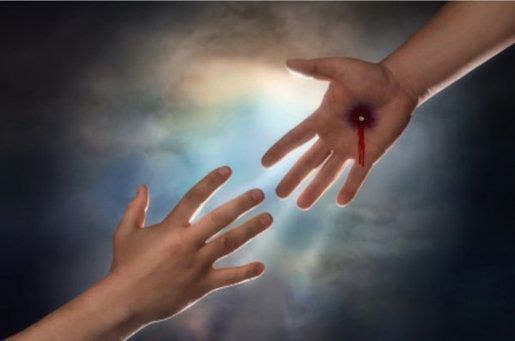
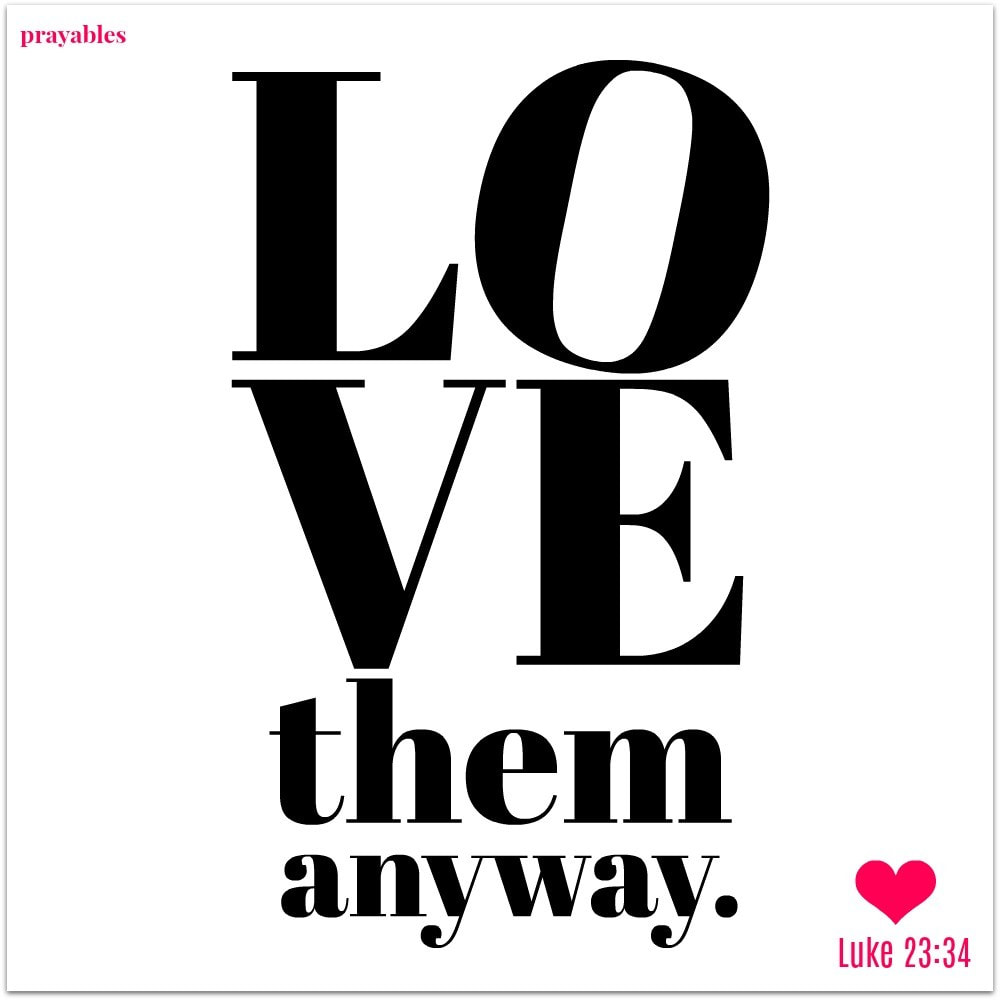
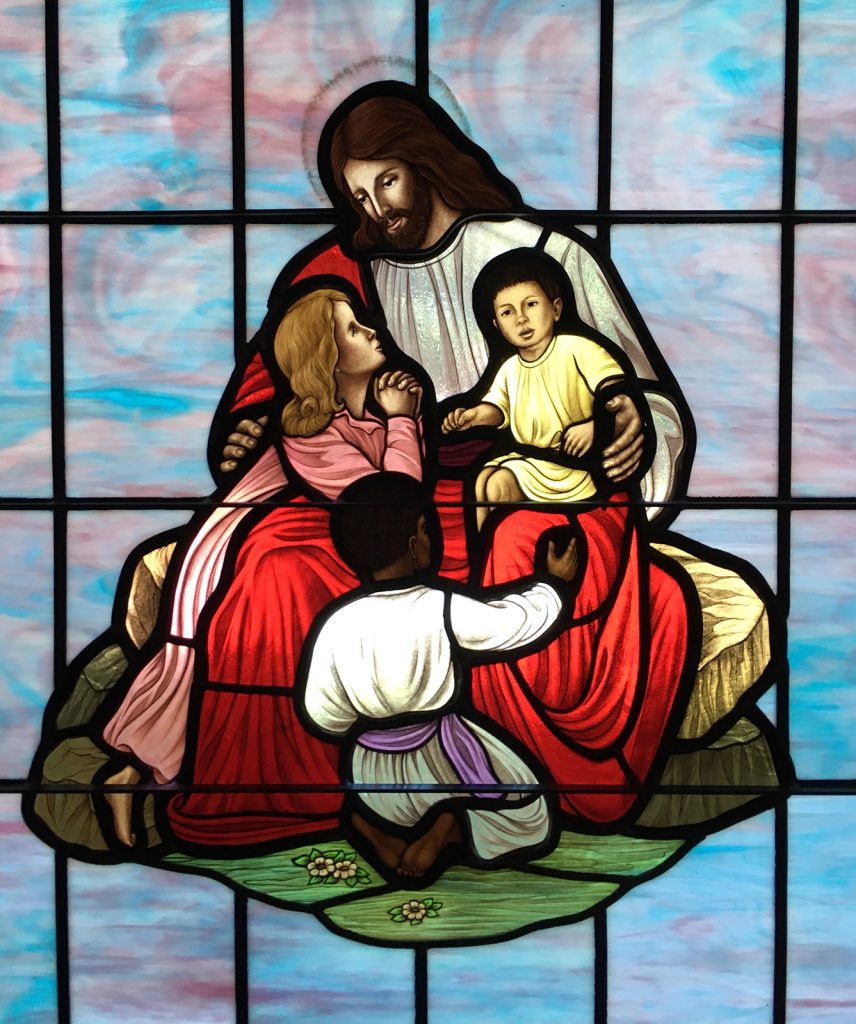
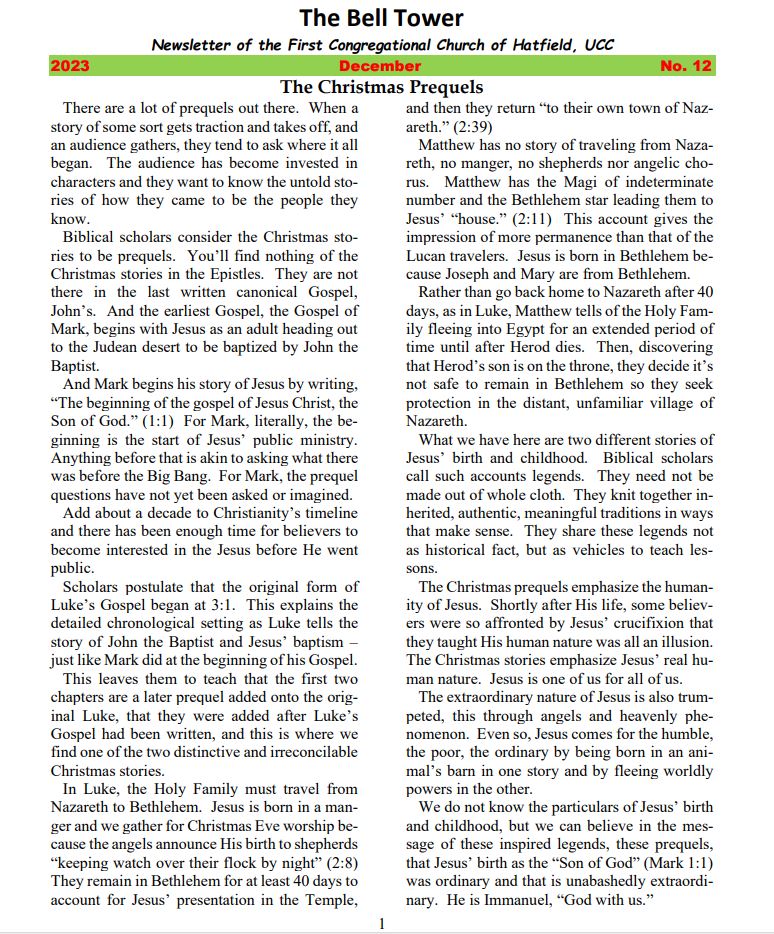
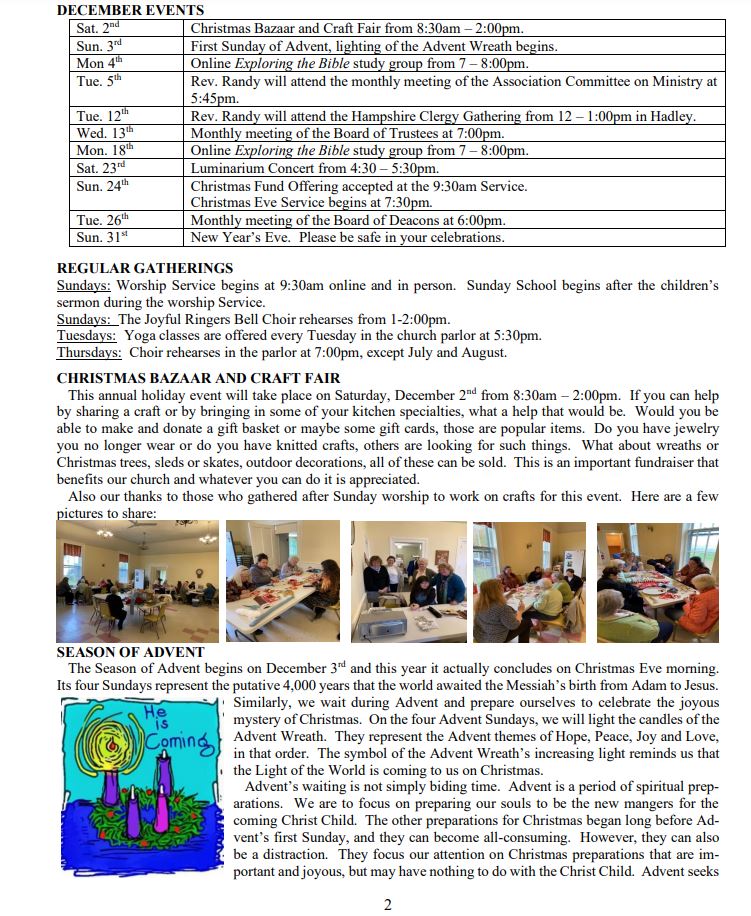
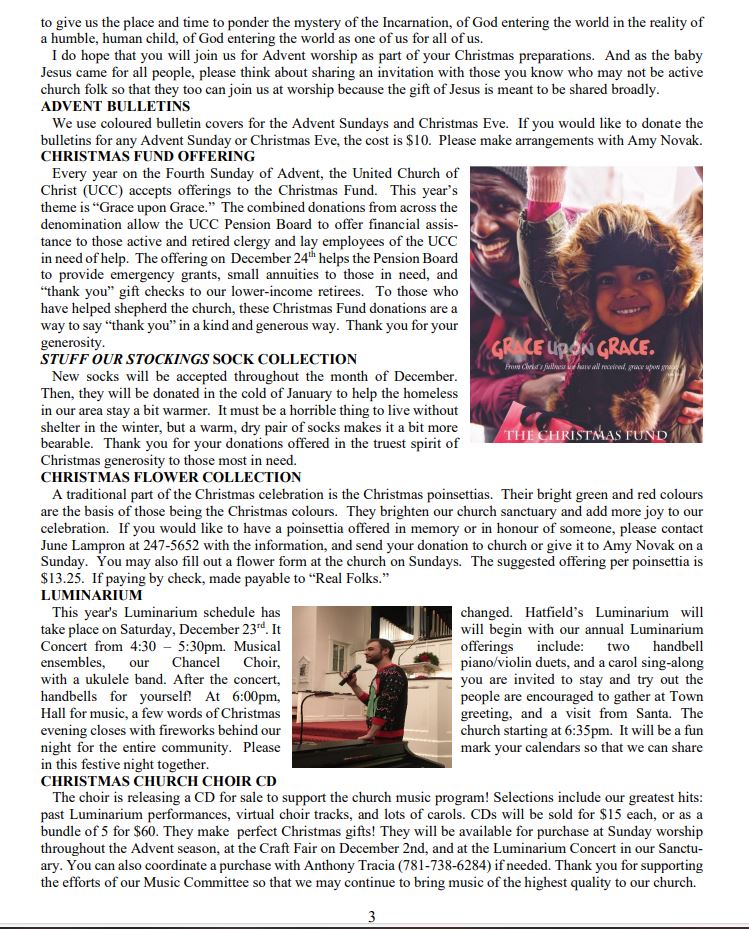
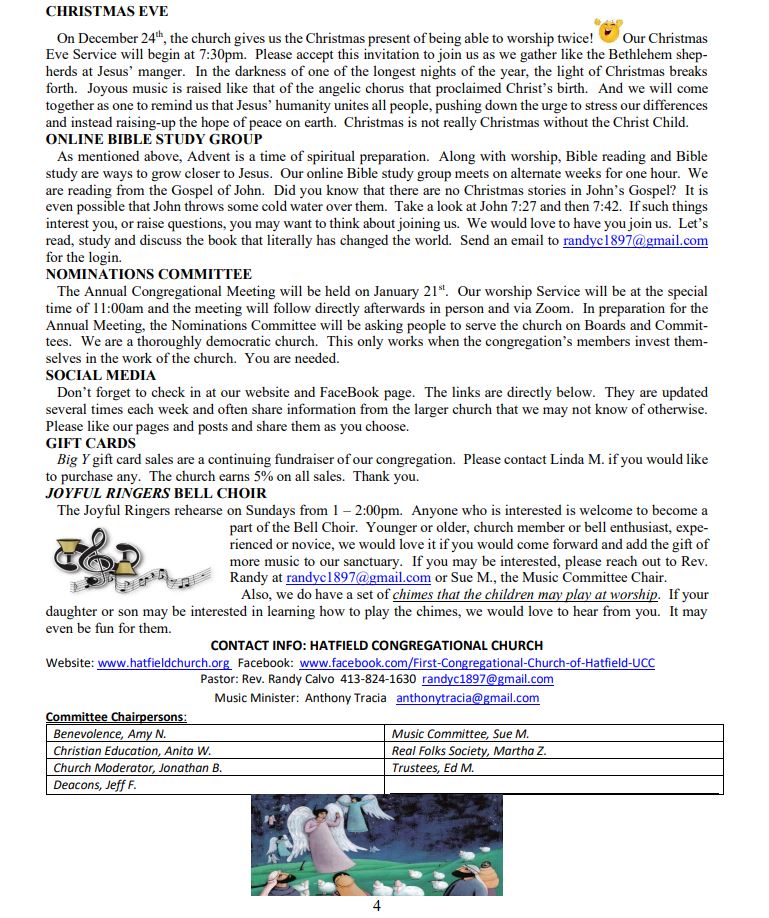
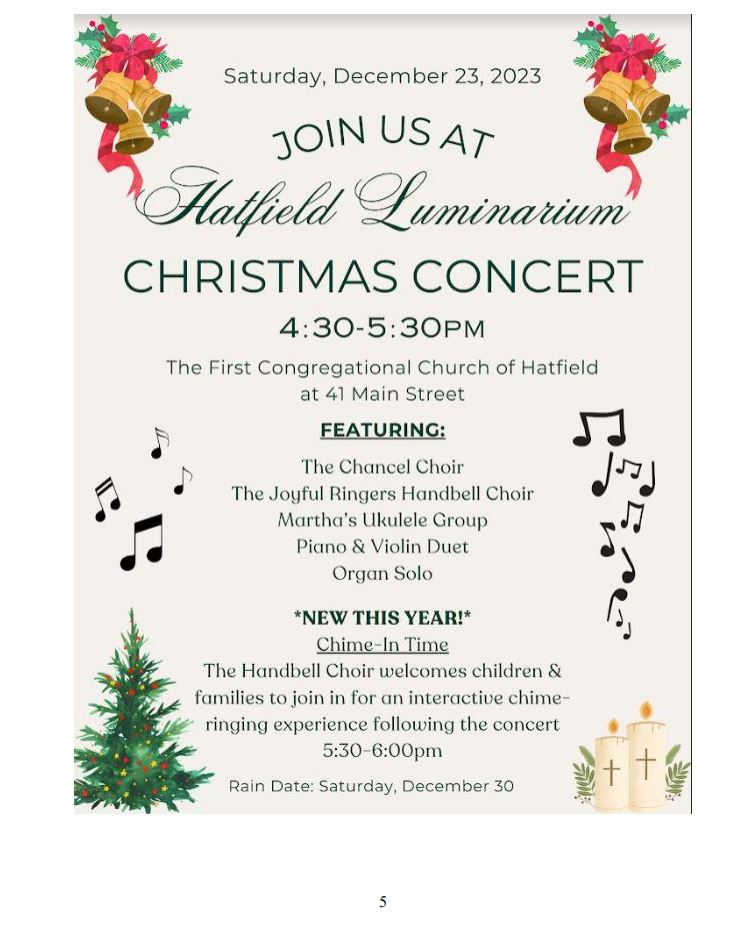

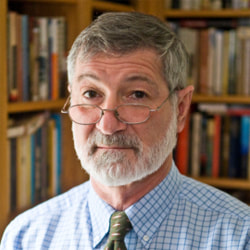
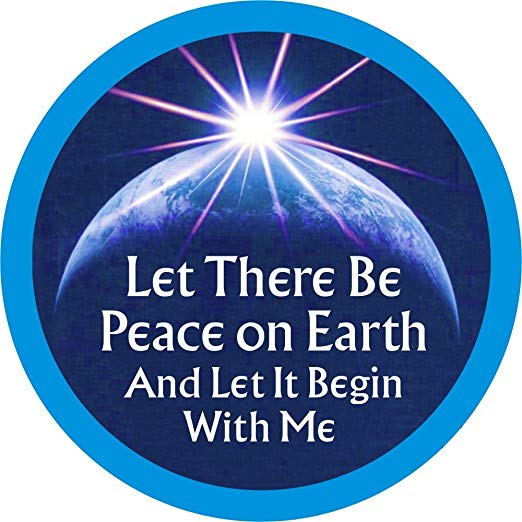

 RSS Feed
RSS Feed
